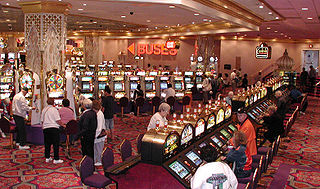
A bookmaker, bookie, or turf accountant is an organization or a person that accepts and pays out bets on sporting and other events at agreed-upon odds.

Prior to the Supreme Court's decision in Obergefell v. Hodges (2015), U.S. state constitutional amendments banning same-sex unions of several different types passed, banning legal recognition of same-sex unions in U.S. state constitutions, referred to by proponents as "defense of marriage amendments" or "marriage protection amendments." These state amendments are different from the proposed Federal Marriage Amendment, which would ban same-sex marriage in every U.S. state, and Section 2 of the Defense of Marriage Act, more commonly known as DOMA, which allowed the states not to recognize same-sex marriages from other states. The amendments define marriage as a union between one man and one woman and prevent civil unions or same-sex marriages from being legalized, though some of the amendments bar only the latter. The Obergefell decision in June 2015 invalidated these state constitutional amendments insofar as they prevented same-sex couples from marrying, even though the actual text of these amendments remain written into the state constitutions.

In the United States, gambling is subject to a variety of legal restrictions. In 2008, gambling activities generated gross revenues of $92.27 billion in the United States.
Gaming law is the set of rules and regulations that apply to the gaming or gambling industry. Gaming law is not a branch of law in the traditional sense but rather is a collection of several areas of law that include criminal law, regulatory law, constitutional law, administrative law, company law, contract law, and in some jurisdictions, competition law. At common law, gambling requires consideration, chance and prize, legal terms that must be analyzed by gaming lawyers within the context of any gaming operation.

The Professional and Amateur Sports Protection Act of 1992, also known as PASPA or the Bradley Act, was a law, judicially-overturned in 2018, that was meant to define the legal status of sports betting throughout the United States. This act effectively outlawed sports betting nationwide, excluding a few states.
Same-sex marriage has been legally recognized in Iowa since a decision of the Iowa Supreme Court on April 3, 2009. Marriage licenses became available to same-sex couples on April 27. This ruling was the result of a lawsuit filed in 2005 by six same-sex couples who had been denied marriage licenses in Polk County. In 2007, the Polk County District Court ruled in favor of the couples in Varnum v. Brien. Two couples were married on September 2, 2007, before the ruling was stayed and appealed. On April 3, 2009, the Iowa Supreme Court unanimously upheld the lower court's ruling, making Iowa the third U.S. state to legalize same-sex marriage, after Massachusetts and Connecticut.

Varnum v. Brien, 763 N.W.2d 862, was an Iowa Supreme Court case in which the Court unanimously held that the state's limitation of marriage to opposite-sex couples violated the equal protection clause of the Iowa Constitution. The case had the effect of legally recognizing same-sex marriage in Iowa. In 2007, a lower court had granted summary judgment in favor of six same-sex couples who sued Timothy Brien, Polk County Recorder, for refusing to grant them marriage licenses.
Indiana law authorizes ten land-based or riverboat casinos on Lake Michigan and the Ohio River, one land-based casino in French Lick, and racinos at the state's two horse tracks. In addition, there is one Indian casino in the state. Other forms of legal gambling are the Hoosier Lottery, parimutuel wagering on horse races, and sports betting.

Gambling in Oregon relates to the laws, regulations, and authorized forms of gambling.
Gambling in Pennsylvania includes casino gambling, the Pennsylvania Lottery, horse racing, bingo, and small games of chance conducted by nonprofit organizations and taverns under limited circumstances. Although casino gaming has been legal for less than two decades, Pennsylvania is second only to Nevada in commercial casino revenues.

Gambling in New Jersey includes casino gambling in Atlantic City, the New Jersey Lottery, horse racing, off-track betting, charity gambling, amusement games, and social gambling. New Jersey's gambling laws are among the least restrictive in the United States. In 2013, the state began to allow in-state online gambling. Five years later, the state won a lawsuit that dismantled Nevada's monopoly on legal sports betting.
Legal forms of gambling in the U.S. state of North Carolina include the North Carolina Education Lottery, three Indian casinos, charitable bingo and raffles, and low-stakes "beach bingo". North Carolina has long resisted expansion of gambling, owing to its conservative Bible Belt culture.
Legal forms of gambling in the U.S. state of Texas include the Texas Lottery; parimutuel wagering on horse and greyhound racing; limited charitable bingo, limited charitable raffles, and three Native American casinos. Other forms of gambling are illegal in Texas.

Gambling in Taiwan is prohibited by the Criminal Code of the Republic of China. State-run lotteries, like the Uniform Invoice lottery, are the only legal form of gambling on mainland Taiwan. The construction of casinos on some off-shore islands was legalized in 2009, though to date none have been built. Some gambling-style games are allowed either on special days or under special restricted circumstances.

Jake Chapman was an Iowa State Senator from the 10th District. A Republican, he served in the Iowa Senate after being elected in 2012 to a seat that had no incumbent due to redistricting. At the age of 28, Chapman won the election and served as the youngest State Senator in the 85th General Assembly.
Legal forms of gambling in the U.S. state of Massachusetts include casinos, sports betting, parimutuel wagering on horse racing, the Massachusetts Lottery, and charitable gaming. The Massachusetts Gaming Commission regulates commercial operations under state jurisdiction.

Legal forms of gambling in the U.S. state of California include cardrooms, Indian casinos, the California State Lottery, parimutuel wagering on horse racing, and charitable gaming. Commercial casino-style gaming is prohibited.
Abortion in Iowa is legal up to 20 weeks of gestation. A 6-week abortion ban has been indefinitely blocked in court.
The history of gambling in the United States covers gambling and gaming since the colonial period.

The 2022 California elections took place on November 8, 2022. The statewide direct primary election was held on June 7, 2022.











